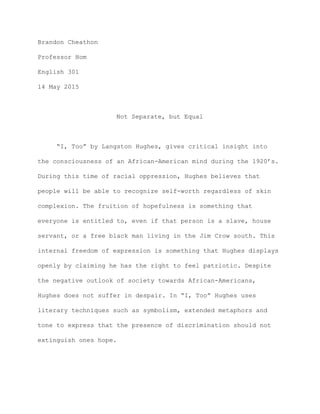Hughes
- 1. Brandon Cheathon
Professor Hom
English 301
14 May 2015
Not Separate, but Equal
“I, Too” by Langston Hughes, gives critical insight into
the consciousness of an AfricanAmerican mind during the 1920’s.
During this time of racial oppression, Hughes believes that
people will be able to recognize selfworth regardless of skin
complexion. The fruition of hopefulness is something that
everyone is entitled to, even if that person is a slave, house
servant, or a free black man living in the Jim Crow south. This
internal freedom of expression is something that Hughes displays
openly by claiming he has the right to feel patriotic. Despite
the negative outlook of society towards AfricanAmericans,
Hughes does not suffer in despair. In “I, Too” Hughes uses
literary techniques such as symbolism, extended metaphors and
tone to express that the presence of discrimination should not
extinguish ones hope.

